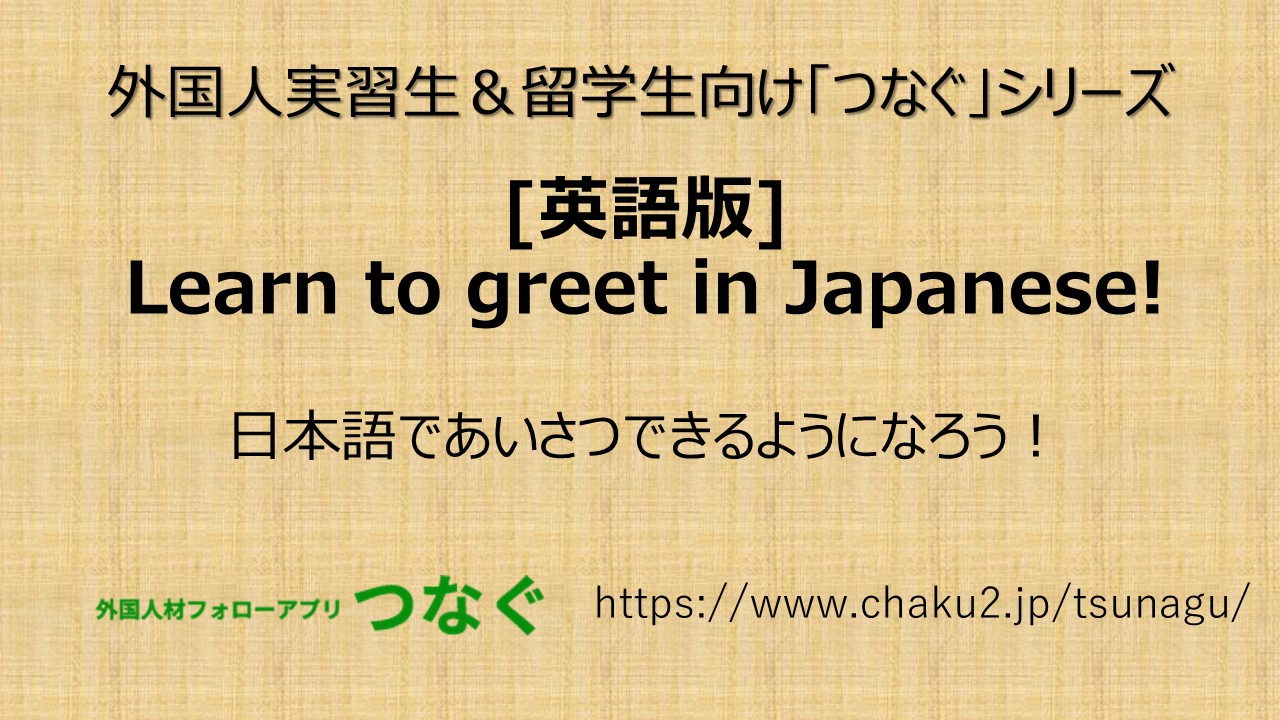2023.03.16
[English version] Learn to greet in Japanese!

Greetings are very important in Japan.
Did you know that greeting people you meet for the first time with a smile leaves a good impression?
Let’s master it!
1. Nice to meet you
“Nice to meet you.” – Hajime mashite
Used when meeting for the first time.
“My name is ○○.” –Watashi no namae wa ○○ desu
Used when telling someone your name.
“I’m from ○○.” –○○Kara kimashita
Enter your country and say
“Thank you very much.” –Douzo yoroshiku onegai shimasu
Say it at the end of your self-introduction. It is also used when asking for something.
2. When meeting and parting
“Good morning.” –Ohayou gozaimasu
I say this when I meet people in the morning. It can be used for various people.
“Good morning.” – Oha you
I say this when I meet my friends, family, or younger people in the morning. Don’t use it on superiors or people you don’t know. Excuse me!
“Hello.” –Konniti wa
Used when meeting someone during the day.
“Good evening.” –Konbann wa
Used when meeting someone at night.
“Goodbye.” – Sayou nara
It is said when parting with someone.
“Good night.” –Oyasumi nasai
It’s a greeting you say before going to bed. Japanese people bow their heads slightly when greeting.
3. When you say thank you
“Thank you.” –Arigatou gozaimasu
It’s a polite way of saying it.
“Thank you.” –Arigatou
It’s a frank way of saying it. Bow your head when you say thank you.
“You’re welcome.” –Dou itashimasite
“No no.” Ee Ee
Say thank you after
4. When to apologize
“I’m sorry.” –Gomen nasai
It’s a frank way of saying it. Do not use in business.
“Excuse me.” – Sumima Senn
It’s a polite way of saying it. It is also used when talking to people and when thanking them. It’s a very useful word.
“I’m sorry.” –Moushiwake arimasenn
It’s very polite. When Japanese apologize, they bow their heads.
5. When you eat rice
“Itadakimasu.”
Say it before you eat. Bring your hands together in front of your chest.
“Thank you for the meal.” –Gotisou sama deshita
I will say it after I eat.
Again, put your hands together in front of your chest.
Both are words of gratitude for the food and the person who made it.
6. When leaving home / when returning home
“I’m coming.” –Itte kimasu
I use it when I leave home.
“Have a nice day.” –Itte rasyai
It is a word to say to people who go out.
“I’m home.” –Tadaima
I’ll tell you when I get home.
“Welcome back.” –Okaerri nasai
Let’s tell the person who came home.
There are some words that are a little long, but please do your best and practice.
